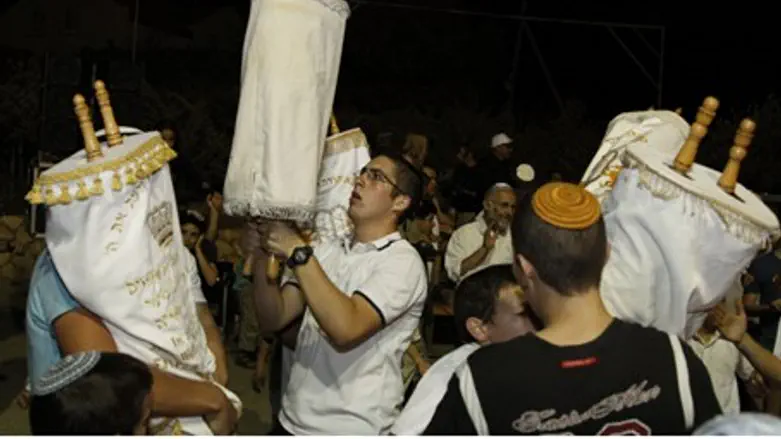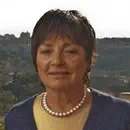
The eight day festival that consists of Sukkot and Shmini Atzeret/Simchat Torah will come to an end Thursday night, bringing an end to the month long holiday season and starting the regular year.
Hebrew calendar days begin from the previous evening; therefore, in accordance with Jewish Law, Arutz Sheva staff will be offline from Wednesday night until the end of the holiday, on Thursday night. Overseas staff will be off until Saturday night in the US.
n Israel, a popular expression is "Acharei Hachagim" - lets' wait till after the holidays - as the entire country seems to put off whatever it can from Rosh Hashanah, sometimes even from the preceding month of Elul, until the day after Shmini Atzeret/Simchat Torah.
The Sukkot holiday marks the last of three yearly pilgrimage festivals to Jerusalem and the Holy Temple - preceded by Pesach and Shavuot - and also the end of the Tishrei holidays, Shmini Atzeret, which begins Wednesday evening and is mandated in the Torah as a final "encore" holiday.
It is an additional day, celebrated on the day immediately following Hoshanna Raba, the solemn last and seventh day of Sukkot which is observed with mystical prayers for salvation in which the congregation marches around the bimah (table for reading the Torah, in the center of the synagogue, ed.) seven times holding the Four Species and then slams five willow branches on the floor to symbolize the destruction of our sins but also that awaiting Israel's enemies - the latter reason not made public knowledge for obvious reasons, as the Maharsha says, positing it as the real meaning of the willow beating.
Hoshanna Raba is also the day on which the Sages said that one's year is finalized by the Almighty and Jews greet one another with the words "Pitka Tava" - hope the Heavenly note with your future is a positive one.
As Sukkot ends, G-d feels for the Jewish people, who want just one more day of joy before returning home from Jerusalem for the winter season and grants it to them. Jewish sages said that G-d, too, says: "It is hard for Me to see you leaving [for home]" and added the "encore" day.
In Israel, Shmini Atzeret and Simchat Torah are combined in a one-day holiday. Outside of Israel, they are separate and celebrated for two days - Shmini Atzeret on the first day, and Simchat Torah on the second.
On Shmini Atzeret, the solemn prayer for winter rains is said, as well as the Yizkor prayer for deceased parents.
The Simchat Torah final holiday marks the conclusion - and starting again - of the annual public weekly readings of the Five Books of Moses, and commemorates the supreme Jewish idea of Torah study in general. Hours-long dancing with the Torah (known as hakafot) in synagogues, yeshivot, and even in the streets marks the day in Jewish communities around the world.
Every male in the synagogue gets called to the Torah, necessitating, in large congregations, using several scrolls and repeating the reading several times. The young children are called up together at the end of the reading, standing - or held - under a prayer shawl while the congregation recites Jacob's blessing to his grandsons.
It has become customary of late for large groups of youths to spend the holiday in towns where the Jewish community is in need of "strengthening," to extend the Simchat Torah joy as far and wide as possible.
In Israel, once the holiday is over, tens of thousands of people attend Hakafot Shniyot, another round of dancing and singing, at celebrations with live music in honor of the Torah that take place all over the country, indoors and outdoors.
Two of the most well known are the outdoor Hakafot Shniyot honoring the different Jewish "edot" [customs of Jews in different parts of the Diaspora] in Jerusalem's Liberty Bell Park sponsored by philanthropist Eugen Gluck and the Hakafot Shniyot at Beit HaRav, the Jerusalem home of Israel's first Chief Rabbi , Rav Avraham Yitzchak Hakohen Kook on the street bearing his name.
Chag Sameach from Arutz Sheva!
For in depth reading on the holiday, see Arutz Sheva's Judaism section.
